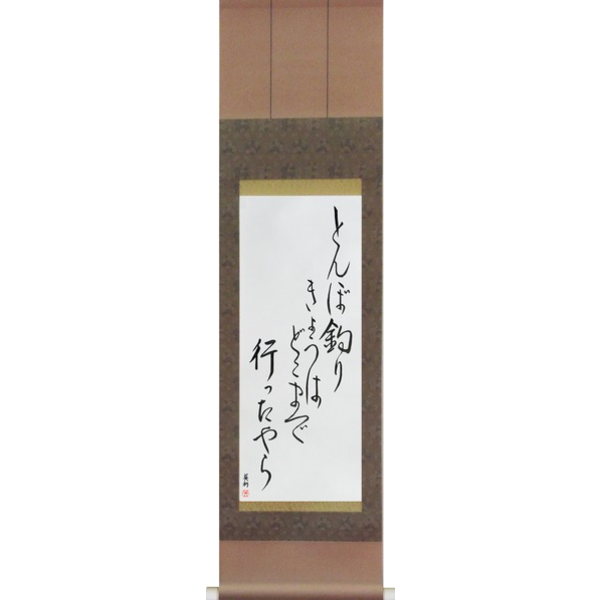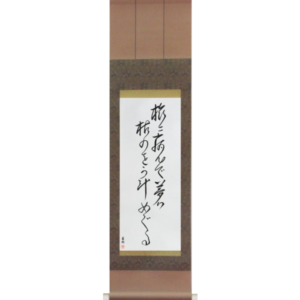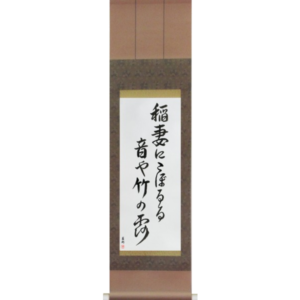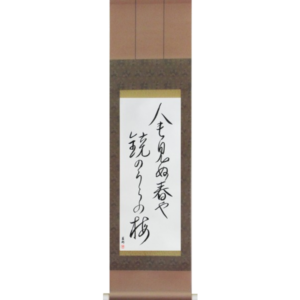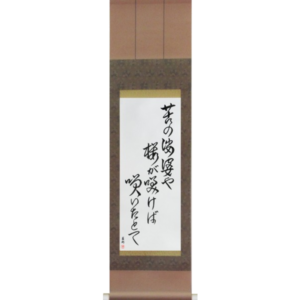H3027 Haiku by Chiyojo – My little dragonfly hunter …
by Master Japanese Calligrapher Eri Takase
My little dragonfly hunter,
where has he gone today,
I wonder [1]
|
tombo tsuri kyou wa doko made itta yara |
蜻蛉釣り 今日はどこまで 行ったやら |
| chiyojo | 千代女 |
Translations of this poem tend to be either too literal or too detached. The last two lines are a single sentence that is simply spoken words – words you could imagine any mother muttering to herself a thousand times: “I wonder where he has gone today?” I think this is important to preserve in the translation and that it is essential to the beauty of the poem.
Chiyojo must have felt this a hundred times when her son was alive – that of simple motherly concern that her little boy was out somewhere, she didn’t know exactly where, out hunting dragonflies. Indeed, the poem stops with the simple expression of concern on where he might have gotten off to. What is left unsaid is the moment after, when the reality bites. In my opinion, she is capturing two things: the first is the obvious pride and seriousness that her boy felt for dragonfly hunting and the second is the concern she felt when he was outside and she would worry until he was again safely home.
What is left unsaid by the poem is the instant after. When she realized all of this was gone.
Buchanan seems to take this position when he writes, “This poem was composed after the death of her little son, her only child, who was fond of hunting dragonflies. Though not described directly, the sorrow of the mother is beautifully and poignantly expressed.” [2]
Buchanan suggests the translation:
Dragonfly catcher,
How far have you gone today
In your wandering? [2]
Blyth suggests the translation:
The little dragon-fly hunter, –
How far I wonder,
Has he gone today. [5]
Lafcadio Hearn, on the other hand, takes this in a different direction where he conjectures that Chiyojo knows her son is dead and is thinking about her son in the afterlife. He writes, “The verse is intended to suggest, not to express, the emotion of the mother. She sees children running after dragonflies, and thinks of her own dead boy who used to join in the sport – and so finds herself wondering, in presence of the infinite Mystery, what has become of the little soul. Whither has it gone? – in what shadowy play does it now find delight?” [3]
Lafcadio Hearn suggest the translation:
Catching dragon-flies! … I wonder where he has gone today! [3]
Henderson writes:
Page’s version has perhaps an added poignancy in the “ran away” – the feeling that the mother cannot bring herself to utter the word “died.” But it does miss the effect of made in the original – the suggestion of “how far has he gone in his journey in the next world?” – a journey believed to be very hard for children unless they had the protection of Jizo Bosatsu, their special guardian.
Henderson suggests the translation:
The dragonfly hunter –
today, what place has he
got to, I wonder … [4]
Rendered by Curtis Hidden Page as:
I wonder in what fields today
He chases dragonflies in play,
My little boy – who ran away. [4]
Kenneth Rexroth suggests the translation:
My hunter of dragonflies,
How far
has he wandered today?” [6]
In my opinion, in this poem, Chiyojo is a mother, not a philosopher.
Calligraphy Notes:
1) For the designs I used hiragana for Dragonfly (tonbo). This is a very feminine poem and I think the cursive, and more so the designed cursive using hentaigana convey the emotions.
Translation Notes:
蜻蛉釣り
今日はどこまで
行ったやら1) 蜻蛉釣り (tonbo tsuri) – composed of 蜻蛉 (tonbo) meaning “dragonfly” and 釣り (tsuri) meaning “fishing; angling”. So the term literally means “Dragonfly fishing”.
Today we use the expression “tonbo tori” catching dragonflies with a net. But, when this poem was written a line was used and the process was much more like fishing – so “tsuri” was used rather than “tori“.
Lafcadio Hearn discusses this a bit on page 118 of A Japanese Miscellany (full text available online). This is a great read – did you know Japan use to be known as Akitsushima and was written with the kanji literally meaning “Island of the Dragonfly”? Akitsu being an ancient word for “dragonfly”. The version in the dictionary has the same pronunciation, but different kanji … too bad.
Notice that dragonfly is written in romaji as both tombo and tonbo. Technically Japanese does not have a single character “m” only an “n”, but in this situation the “n” is often pronounced like an “m” and so the romaji reflects this. A dictionary would use tonbo.
Finally the “My Little” is not in the original Japanese. Chiyojo is talking about her little boy and this sentiment fits the poem. A more direct translation would be:
Dragonfly hunter.
I wonder where he is
off to today. [1]2) 今日 (kyou) – means “today; this day”.
3) は (wa) – Written as “ha” but it is read as wa. This states “today” as the topic.
4) どこまで (dokomade) – “how far; to what extent”.
5) 行った (itta) – past tense of the verb 行く (iku) meaning “to go”.
6) やら (yara) – yara is a particle denoting uncertainty. I think the translation of “I wonder” fits this well.
References:
[1] Translation by Timothy L. Jackowski, Takase Studios, LLC.
[2] 67.
[3] 118.
[4] 82.
[5] 223.
[6] 223.
